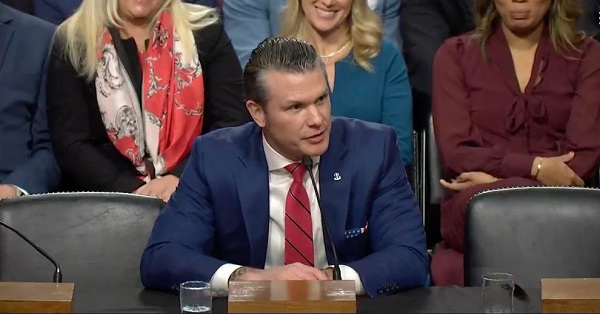From The Center Square
By
Defense Secretary Pete Hegseth said he plans to welcome President Donald Trump’s Department of Government Efficiency to the Pentagon.
Hegseth, who joined troops for morning physical training excercises on Tuesday, spoke to reporters as he was leaving the U.S. Africa Command headquarters in Stuttgart, Germany, during his first official trip overseas.
Hegseth said he wants to see additional investment in the U.S. military but noted the consequences of growing U.S. debt.
“You always want more, but we live in fiscally constrained times where we need to be responsible with taxpayer dollars,” he said. “We’re $37 trillion in debt. That’s a national security liability as well.”
Secretary of Defense Pete Hegseth speaks to reporters in Germany on February 11th, 2025
The U.S. Department of the Treasury reports the country holds about $36.2 trillion in debt, but the real figure is much larger. The Penn Wharton Budget Model estimates that extending tax and spending projections to cover all current and future generations, the infinite horizon fiscal imbalance is $162.7 trillion, or 6.6% of the present value of all future GDP, according to a recent report. GDP, or gross domestic product, is a measure of economic output.
Hegseth also said he would welcome DOGE and its leader Elon Musk to review the Pentagon’s $849.8 billion budget.
“We’ve been talking with them, in partnership with them and as I said on social media, we welcome DOGE to the Pentagon,” Hegseth said. “There are waste, redundancies and headcounts and headquarters that need to be addressed. There’s just no doubt – look at a lot of the climate programs that have been pursued at the Department of Defense. Defense Department is not in the business of climate change, solving the global thermostat. We’re in the business of deterring and winning wars.”
Secretary of Defense Pete Hegseth speaks to reporters about DOGE on February 11th, 2025
He also mentioned weapon system procurement as potentially ground for DOGE to investigate.
“There’s plenty of places where we want the keen eyes of DOGE, but we’ll do it in coordination,” he said. “We’re not going to do things that are to the detriment of American operational or tactical capabilities.”
Hegseth suggested there could be “billions” to cut from the Pentagon’s budget.
Shortly after Trump created DOGE, Musk turned his eye to the U.S. Department of Defense. U.S. Sen. Bernie Sanders, an independent from Vermont, has publicly said he agrees with Musk when in comes to the Pentagon’s budget.
“Elon Musk is right,” Sanders wrote on X. “The Pentagon, with a budget of $886 billion, just failed its 7th audit in a row. It’s lost track of billions.”
Musk wrote in a November op-ed that the military was on his list.
“The Pentagon recently failed its seventh consecutive audit, suggesting that the agency’s leadership has little idea how its annual budget of more than $800 billion is spent,” the op-ed said.
The U.S. Department of Defense’s annual audit once again resulted in a disclaimer opinion. That means the federal government’s largest agency can’t fully explain its spending. The disclaimer this year was expected. And it’s expected again next year. The Pentagon previously said it will be able to accurately account for its spending by 2027.
Musk has gone even further in his criticism of military spending. He called the military’s most expensive ever project, the F-35 stealth fighter, “obsolete.”
In May 2024, the U.S. Government Accountability Office found the cost of the Pentagon’s most expensive weapon system was projected to increase by more than 40% despite plans to use the stealth fighter less, in part because of reliability issues.
The U.S. Department of Defense’s F-35 Lightning II is the most advanced and costly weapon system in the U.S. arsenal. It’s a joint, multinational program that includes the Air Force, Navy, Marine Corps, seven international partners and foreign military sales customers.
The Pentagon has about 630 F-35s. It has noted plans to buy about 1,800 more, and it intends to use them through 2088. DOD estimates the F-35 program will cost over $2 trillion to buy, operate, and sustain over its lifetime.

















